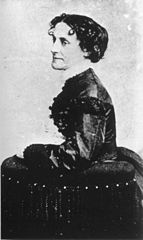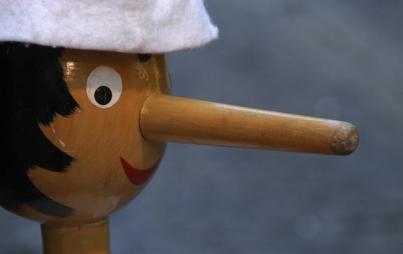
Real talk: Did you pay attention in your former history classes? If the answer is "no"—and you relied on these courses primarily as a way to catch up on much-needed sleep—let us introduce you to Karen Abbott.
This prolific writer turns history into something engaging, suspenseful, and altogether alive, slyly educating readers when they simply thought they were having a good time. She captures history's most compelling moments on the Smithsonian Magazine's history blog, via a New York Times series, and in her nonfiction works (that read more like novels), often casting new light in particular on history's most compelling women. Her latest book, Liar, Temptress, Soldier, Spy, is about lady spies during the Civil War.
We caught up with Abbott to talk about seminal moments in history and the gloriously "bad" women who shaped them.
Much of preserved history was recorded by privileged men. As a female historian, how do you feel this has limited our understanding of the past?
Few Civil War-era women are household names, and the ones who are (Mary Todd Lincoln, for example) achieved fame through their association with men. Most of my reader mail begins along the lines of, "I can't believe I've never heard of these women"—especially in the case of Elizabeth Van Lew, who was arguably the Civil War's most important spy (North or South, male or female) and who in effect won the war for the Union. It's been a pleasure and a privilege to write these women's stories, and hopefully make a few more people aware of them and their incredible contributions.
Your research has uncovered interesting facets of life for women in the past (such as the hatpin, a self-defense weapon for women). What's the most interesting thing you've uncovered through your research?
While researching Liar, Temptress, Soldier, Spy, I read that 400 women disguised themselves as men and enlisted to fight, for both North and South. It was intriguing to research exactly how they got away with this deception, and I concluded that it was mostly due to the fact that no one knew what a woman would look like wearing pants. People were so used to seeing women's bodies pushed and pulled into exaggerated shapes with corsets and crinolines, and the very idea of a woman in pants (let alone an entire army uniform) was so unfathomable that no one could see it.
How do you seek to make history accessible and exciting for modern audiences?
I spent five years researching Liar, Temptress, Soldier, Spy, and read every diary entry, memoir, letter, archive, and newspaper clipping I could find about my women spies and the people in their lives. If I go into a character's head, it's because the source material allows me to do it. I think those sorts of details are just as vital as documenting their heroics on the battlefield; I want my characters to be relatable, and their lives to be as dramatic on the page as they were when they lived them. Some people rigidly adhere to one camp or the other—academic versus popular history—and have the philosophy that never the twain shall meet. I think that history can be both accessible and well-researched, and that's what I try to do in my books.
What sparked your interest in history? How about writing?
I always liked to write, but I didn't think I'd grow up to be a writer; it just didn't seem like a viable career option. I was actually planning to go to law school, but during my junior year of college, I got an internship at Philadelphia magazine. Every day I heard new stories, stories that took me far away from my own life, and I decided I'd like to try journalism. I also stumbled into history. My great-grandmother's sister disappeared in Chicago in 1905, and I was always intrigued and haunted by this bit of family lore. I began researching Chicago during that time period, and came across an article about Marshall Field Jr., who was reportedly shot while visiting the world's most famous brothel, a lavish place called the Everleigh Club. Sad to say, I forgot all about my missing relative and instead focused on the two mysterious sisters, Minna and Ada, who operated the club. That led to my first book, Sin in the Second City, and I've loved history ever since.
Your latest book, Liar, Temptress, Soldier, Spy: Four Women Undercover in the Civil War, tells a fascinating story of undercover female spies. Not only did you use primary sources, but you contacted descendants of these women. What was it like speaking with them?
I spoke quite a bit with Bart Hall, a descendant of Elizabeth Van Lew's brother, John Van Lew. He told me details about her incredible operation that had never been published before, including the extent of John's participation in Elizabeth's spy ring; he used the family's hardware business as a front. He'd take blank invoices and purchase orders and fill them out as if conducting legitimate business, but every number corresponded to certain military terminology. For example, 370 iron hinges meant 3,700 cavalry; 30 anvils meant 30 batteries of artillery. The paperwork looked legitimate enough to fool rebel sentries, but he was able to decode it for Union officials once he made it to their lines.
 In addition to writing Liar, Temptress, you contribute to a New York Times series about the Civil War. Why the fascination with this period of history?
In addition to writing Liar, Temptress, you contribute to a New York Times series about the Civil War. Why the fascination with this period of history?
I was born and raised in Philadelphia, and moved to Atlanta in 2001, where I lived for six years. It was quite a culture shock! I had to get used to seeing the occasional Confederate flag, the jokes about the "war of Northern aggression." The point was really driven home for me one day when I was stuck in traffic behind a pickup truck with a bumper sticker: DON'T BLAME ME—I VOTED FOR JEFFERSON DAVIS. I was struck by the idea that Civil War personalities and politics lived on, in ways both frivolous and sincere, nearly a century and a half after the last body was buried and the final sacrifice made. And of course, I was most concerned with what the women were doing—especially the defiant women, the "bad" women. I wanted to find women who lied, seduced, wheedled, plundered, spied, drank, avenged, stole, and murdered their way through the war, and I think Belle Boyd, Emma Edmonds, Rose Greenhow, and Elizabeth Van Lew all qualified.
Your next book will be about Gilded Age con artists. How'd you hit upon this idea for a book? Any particularly interesting facts you've come across in researching it, to whet our appetite for the book's release?
I wrote about this woman for the Smithsonian, and haven't been able to stop thinking about her since. There's not enough material for a nonfiction book, so I'm going to have to fill in the gaps, to create flesh for her bones. I'm at the very beginning stages of my research, but basically she cons her way into New York society, and then faces a life-and-death confrontation with her past.
If you could live in any decade, which would it be? Why?
Either Chicago or New York during the turn of the 20th century. There was tremendous growth and an overwhelming sense that anything was possible. Women were starting to demand more freedom, leaving their homes to take jobs, lobbying for the right to vote. On a more superficial level, I'd swoon over the fashion and architecture.
How does history remember women living in that era?
Southern women in particular rebelled against propriety, shedding the notion of the genteel "belle." They spat at Union soldiers occupying their towns, emptied the contents of chamber pots on their heads, and talked openly and defiantly about their political allegiances. The idea of female traitors was unthinkable before the war began; women were seen as victims of war, not perpetrators. But as the war went on, and the spies' activities came to light, the men and charge had to grapple with a new and frightening reality: Women were capable not only of significant acts of treason, but of executing them more deftly than men. One Lincoln official posed this question: "What are we going to do with these fashionable women's spies"? It was great fun to research and write about their dramatic cat-and-mouse games.






